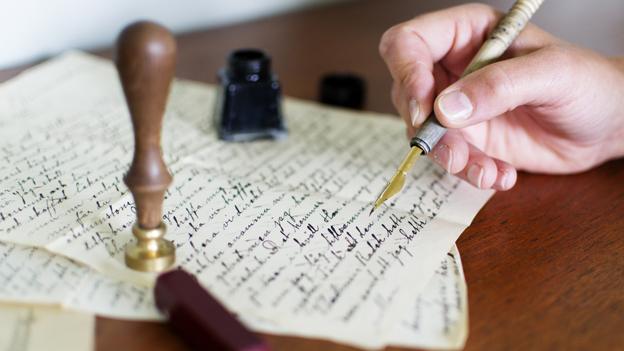Sending a postcard from somewhere you've never been
- Published
Sending a postcard from Timbuktu
How many handwritten letters and personal postcards did you send this year to friends and family? How many have you received?
We're in a world where billions will log on to social media and chat apps so they can communicate instantly with friends and family overseas. But perhaps we are at a point where people want to return to a more simple world, where physical letters give us a sense of reality.
Some businesses certainly think it's time that we do.
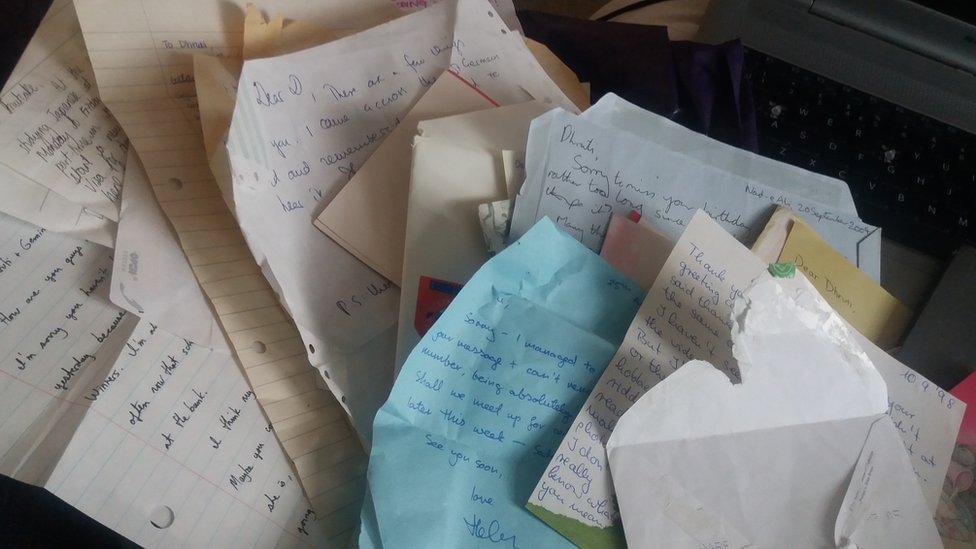
Just some of the letters I have hoarded over the years
I'm that friend who keeps every handwritten personal note and letter I've ever received. I have a box at home where these letters live - some are from old friends, some are from now long dead loved ones, and some mark momentous occasions in my life.
A few months ago I spotted - on Facebook, ironically enough - a friend posting about a business set up to help unemployed tour guides in Mali make money, be active and tap into a letter-writing community which appears to be seeing a bit of a revival.
Postcards from Timbuktu was set up by Phil Paoletta and it does it exactly what the name suggests. You can be anywhere in the world, log on to your computer and send a postcard via one of the most remote places in the world.
Mali doesn't get a huge amount of visitors - the UK Foreign and Commonwealth Office advises against all but essential travel to the country because of the instability it has seen in recent years.
However, Mali has a strong literary culture and its spiritual and intellectual capital, Timbuktu, has been an important desert trading post throughout history. To get a postcard stamped at its post office was to know people in a very far away place.
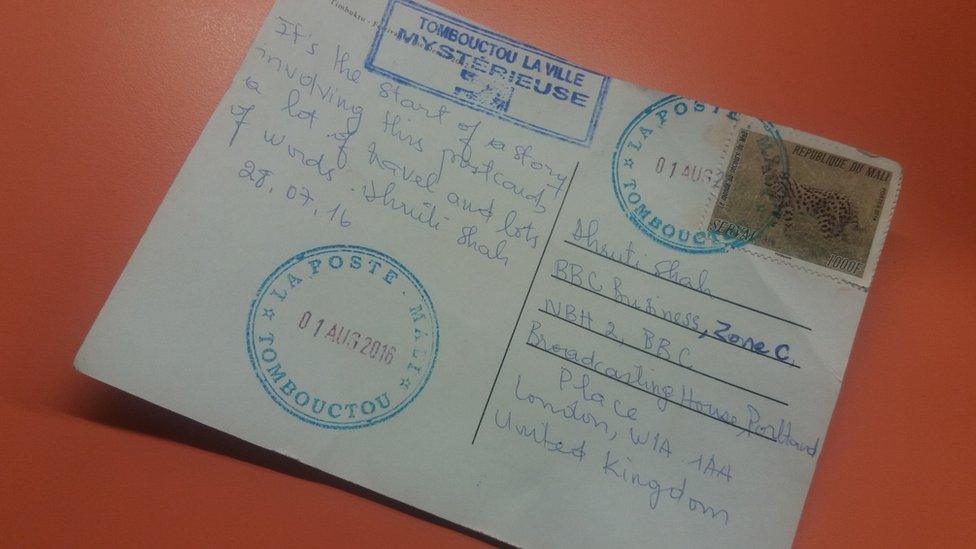
I decided to send myself a postcard from Timbuktu - it arrived months later
Phil was in Bamako in Mali in January 2015 when he received a postcard from a friend in the US. "It was the first time I had received a postcard in years," he recalls. "You rarely get tangible mail these days."
Coincidentally, that same day Phil ran into his friend Ali Nialy, a former tour guide from Timbuktu who was trying to find a job and having real difficulties. "Unless you're working for the UN or an NGO, there's nothing out there for you."
The two came up with the idea of setting up the business, word quickly spread, and the operation now involves 10 people. You log on to the site, type out a personalised note, pay $10 (£8) and at some point in the future, a handwritten postcard with a Timbuktu stamp pops through your (or your chosen recipient's) letterbox.
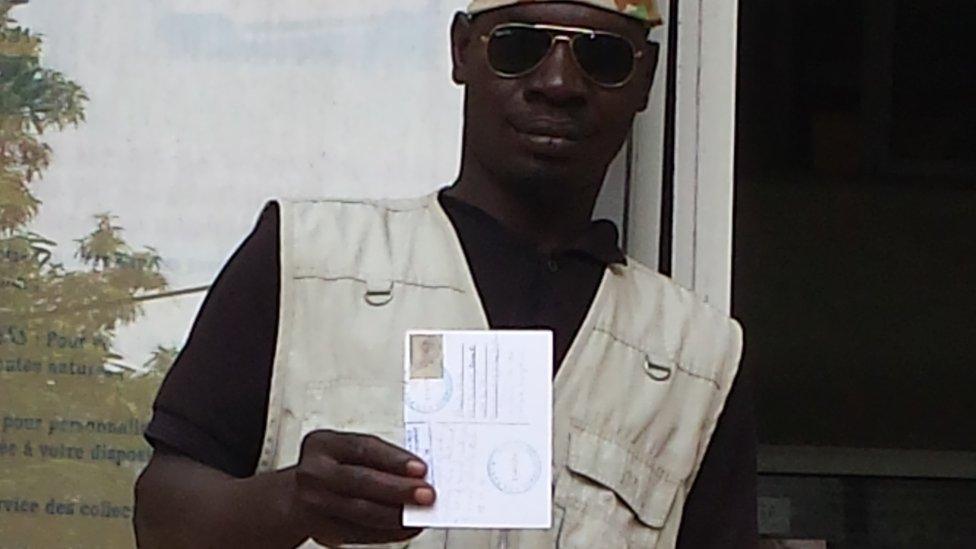
Hadji picked up my postcard after it arrived in Bamako from Timbuktu
Once you've paid up, the words you write are sent via Whatsapp to a writer in Timbuktu. The note is then delivered by the postman on his bike to Timbuktu's Post Office where it gets its all important stamp. Then it's sent back to Mali's capital Bamako, sometimes through a hitched ride on a UN flight down to the city. This is essential as it's only possible to send mail internationally from Bamako.
"We get all sorts of messages. One couple sent a card to the person they wanted to officiate at their wedding. We've had birthday messages, get well soon messages, passive aggressive notes - everything," says Phil.
"It's been really interesting for the former tour guides because they are used to interacting with people all over the world and although there are fewer tourists now, they can still be ambassadors for Timbuktu through this."
The team have sent hundreds of postcards with interest surging. Phil says the current business model means the tour guides get about $6 after shipping, printing, the website platform costs and taxes are set aside. "So for a $10 postcard, they get a decent amount of money for what amounts to a few minutes' work really."

Read more:

It's an idea that science educator Jean Pennycook is familiar with. She works in a remote part of Antarctica - Cape Royds - where she lives with Adelie penguins for several months of the year.
For the past 13 years, thousands of people have sent her postcards they've designed with pictures of penguins on - so she can return them with a very special Antarctica postmark.
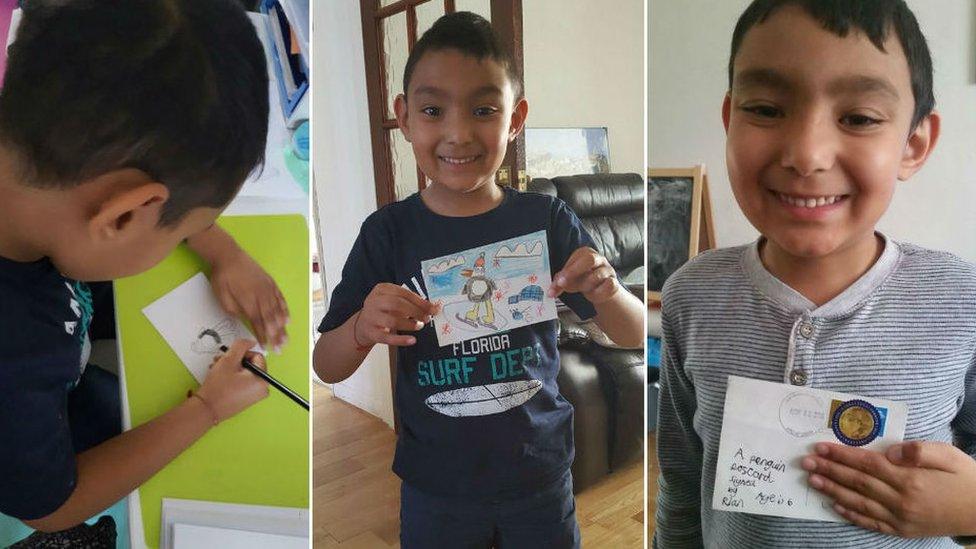
Rian drew this postcard. Months later it came back with a special stamp from Antarctica (right)
"It's a valuable postmark as you can't get it unless you mail the letter in Antarctica. This project is providing a geography lesson, a penguin studies lesson and a letter-writing lesson as the kids have to do it all themselves," says Jean.
"Sometimes an entire school will send postcards down to me. To save money, we do it in bulk and instead of maybe costing $100, we're able to send them all back and it costs them just $5 in prepaid stamps. I will put the postmark on each card anyway and stamp them with a penguin stamp so everyone can still take part."
Jean has no specific funding for the postcard project from the grant which allows her to travel to the remote region but she sees it as a key part of her role. She might be in the wilderness but is pretty connected. She regularly updates her website, hosts Skype chats and livestreams the penguins hanging out.
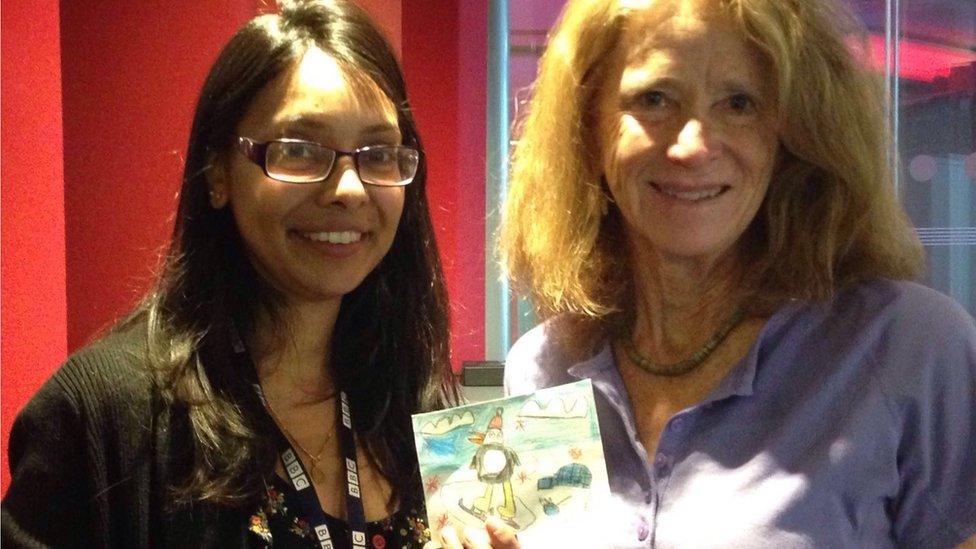
Handing Rian's postcard over to Jean when I met her in London
Author Jon McGregor edits The Letters Page - a literary journal that only accepts handwritten submissions and pays £100 for those chosen for publication.
He gave up email for an entire year, asking people to contact him via letter only in a bid to try to focus on his latest novel.
"A lot of people actually just left me alone. A few people who did write to me and send me stuff by post - those communications actually developed into meaningful connections with other writers. It showed the difference between email and letters and the way you can forge a connection with someone," he says.
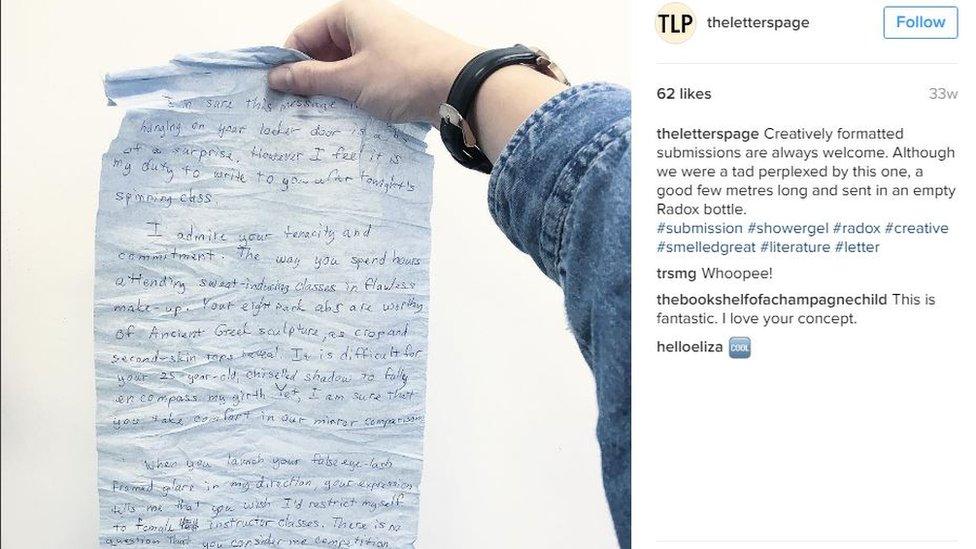
The Letters Page journal only accepts handwritten submissions but it does pay for them
"But at the same time, I realised how convenient email is. You're able to contact more than one person at once and send documents or pictures. It was quite a relief to get to the end of the year.
"When I started The Letters Page, it was interesting to see how many people shared that nostalgia for letters and letter writing. The envelope it comes in bears the traces of the journey, while the letter itself - the handwriting, the coffee stains, the doodles, the choices of paper - all of these are part of the message. When you get an email, you just get the words and that's that.
"I think people are looking back to letters and letter writing as a general reawakening of things which are hand-made or unique in some way and have a personal touch."
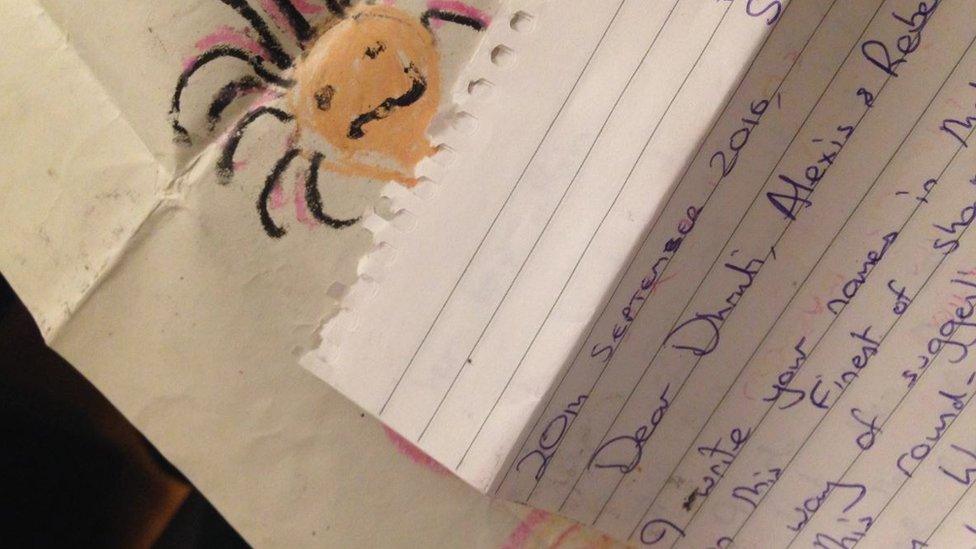
I am now taking part in an experiment following a letter trail with friends Andrew in Sierra Leone, Alexis in Nigeria and Rebecca in London
Both Jon McGregor and Jean Pennycook say that many young people are now used to the informal way language is used in social media and so letter writing is an extra skill for them to master.
"There are many who have had no training in how to write a letter or that writing an email can be as formal as writing a letter. That's a life skill - changing your register and recognising your audience," says Jon.
"Students can grasp if they are writing a letter for an application for a job or a course, they have to write with a certain level of formality, but they don't necessarily straight away grasp they need a different tone of voice with their friends on Whatsapp than they do with their grandmother."

Letters Live has become an incredibly popular event with celebrities reading out letters
But could the art of letter writing become a viable business market for some? Go online and you'll see people live blogging events such as Letters Live - where audiences pay to watch celebrities read out letters, or check your phone and come across apps or platforms such as My Postcard or Touchnote which will send your pictures as postcards to loved ones.
"If I get a postcard from someone who's away somewhere, it's as much the thought that they've gone through the hassle of choosing a postcard, working out where to get a stamp from, finding a postbox and then the postcard making that journey through to me. That's part of the value of the postcard as an object which you can handle," says Jon.
So, if anyone wants to send me a postcard or a letter from an unusual place, feel free... and if you do it from somewhere in the middle of nowhere, even better.
Follow Dhruti Shah on Twitter, external and on Facebook, external
- Published22 September 2016
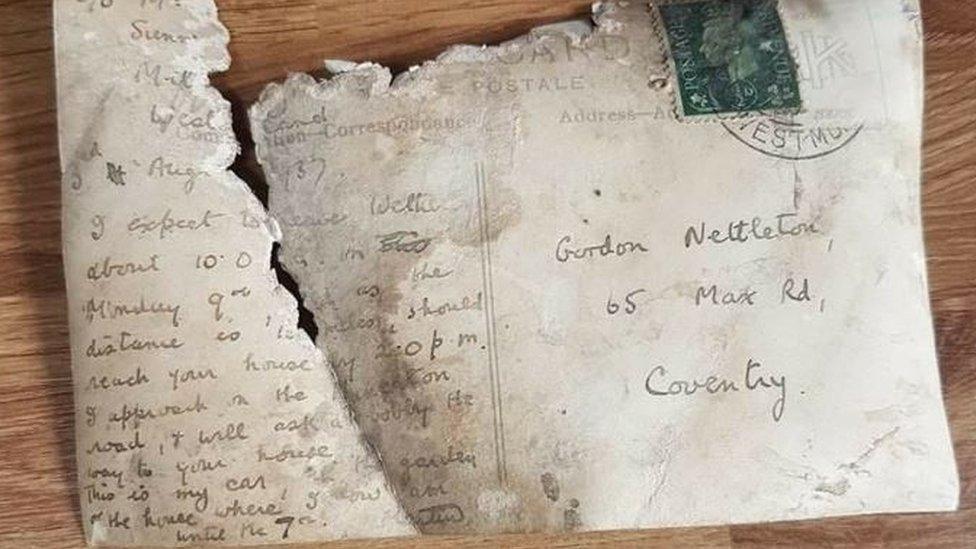
- Published31 August 2016
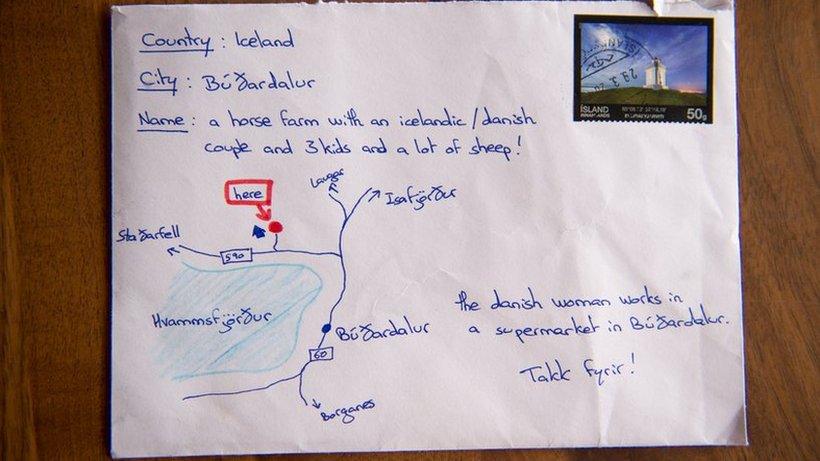
- Published10 August 2015
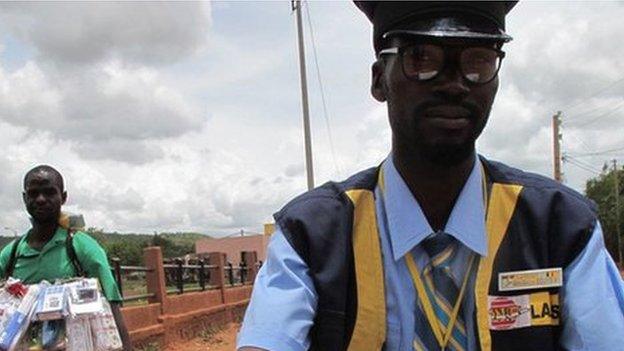
- Published19 March 2015
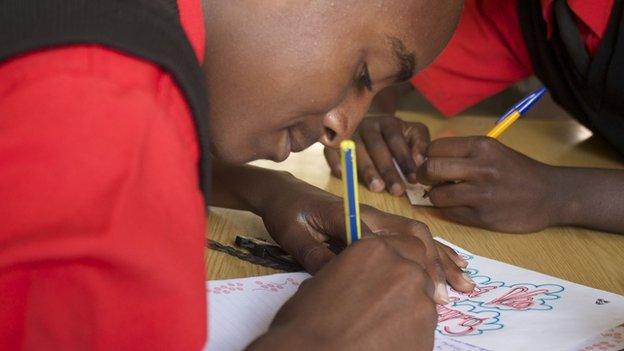
- Published2 April 2015
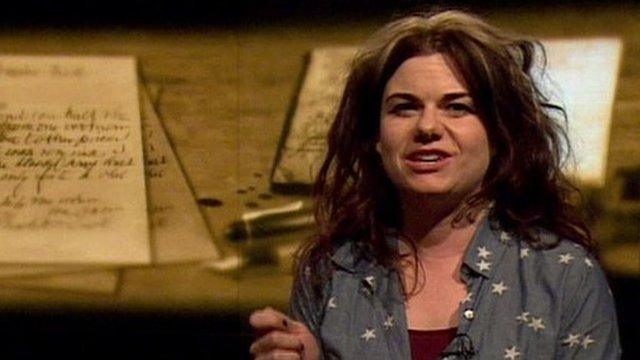
- Published28 October 2013
